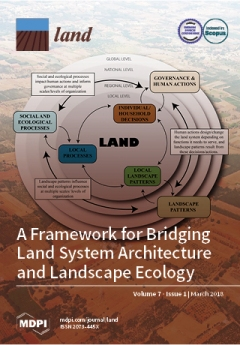1
Department of Geography, University of the Aegean, University Hill, 81100 Mytilene, Greece
2
Faculty of Organic Agricultural Sciences, Steinstr. 19, 37213 Witzenhausen, University of Kassel, Kassel 34125, Germany
3
Department of Agricultural Economics and Rural Development, University of Göttingen, Platz der Göttinger Sieben 5, 37073 Göttingen, Germany
4
Chair of Nature Conservation and Landscape Ecology, University of Freiburg, Tennenbacher Str. 4, 79106 Freiburg, Germany
5
ALTICIME, 60 rue Joseph Desbois, 69330 Meyzieu, France
6
Centre for Landscape and Culture, School of Humanities, Tallinn University, Uus-Sadama 5, 10120 Tallinn, Estonia
7
Chair of Societal Transition and Agriculture, University of Hohenheim, Schloss Museumsflügel Ost, 70593 Stuttgart, Germany
8
European Landowners’ Organization, Rue de Trèves 67, 1040 Brussels, Belgium
Abstract
The concept of landscape has been increasingly used, in the last decades, in policy and land use planning, both in regard to so-called “special” and to “ordinary” or “everyday” landscapes. This has raised the importance of local and public participation in all issues
[...] Read more.
The concept of landscape has been increasingly used, in the last decades, in policy and land use planning, both in regard to so-called “special” and to “ordinary” or “everyday” landscapes. This has raised the importance of local and public participation in all issues that refer to landscapes and the definition of the groups that “have a stake” in the landscape. In this paper, we provide insights into how stakeholders perceive the dynamics of local processes of landscape change (and continuity) and which processes of landscape change they perceive as important, in positive and negative ways, from five communities within the European Union. These landscapes involve different landscape issues “at stake”, different national and local planning and decision-making traditions and practices, and varying degrees of engagement. The understanding of these complexities and the unraveling of the insights is done through the concept of social capital and its different forms. We report on three series of workshops that have been organized to discuss landscape issues and approaches or ideas for landscape management. We witnessed interactions between the different stakeholders and gained insights into how social capital affects landscape change. We found that despite differences, similarities emerged concerning the interplay between “expert” and “local” knowledge and between “insideness” and “outsideness”. Social capital plays an important part, as it provides the template for personal and collective evaluation of landscape changes, who should manage these changes and how they should be managed. These findings are important to develop in-depth insights on dynamics and values of cultural landscapes and visions for re-coupling social and ecological components in cultural landscapes and translate them into policy and management options.
Full article





